Introduction
 (License: CC0]:Pixabay
(License: CC0]:Pixabay Well, this was until I experienced virtual reality for the first time in my life at a local cinema. Since then I have been buzzing with a need to know more and more about the concept behind this technology.
I have spent hours reading about Virtual reality and even discovered its cousin, Augmented reality.
The beauty of these two concepts is that they enhance the human experience of events. I will elaborate on this briefly: The period I visited the 7D cinema, I had heard the hypes of how it will make me feel as though I was in the movie itself. Well, I went there not expecting to feel anything of the kind they described.
Completely sure I would predict and not be moved in the slightest bit. I just accepted to come along so as to please a couple of friends that begged me to tag along. We got 7D passes to watch the haunted house. We had to seat strapped to a mobile seat and wear 3D interactive goggles. As I stated earlier, I was unenthusiastic about it and just wanted to get it over with.
I will tell you honestly. It felt like being conveyed from reality into another dimension where every superstition was true. I found myself inside the flick and I was the centre of attraction.
Imagine being inside a house where all your childhood horrors come to life! I could feel the slightest of sensations, my skin crawled when the doors creaked, I felt bumps raise on my skin when invisible hands grabbed me, and the floors creaked under me!
It was terrific! Even when I felt through a floor, I could feel the momentary wind and everything falling away from me, (However, I could not feel the pain on landing, Lol).In truth, the experience wasn’t a hundred per cent but it was somewhere around 70 and the best part was, I felt fear again for the first time in so many years!
This had me hyped up about the technology behind it and finally, I will now write briefly about it!
What is Virtual Reality?
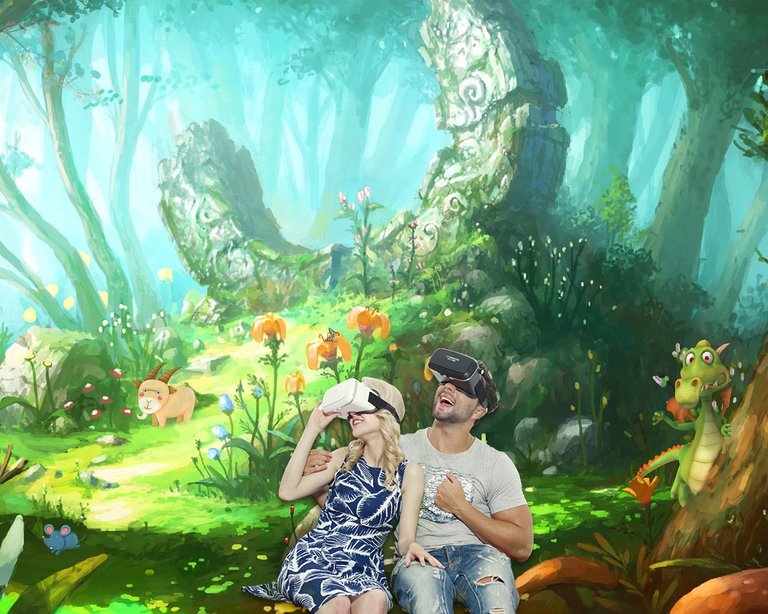 Look! It’s a whole new world(License: CC0.]:Pixabay
Look! It’s a whole new world(License: CC0.]:Pixabay Virtual reality in simple terms is the situation where a computer environment replaces our real environment. Like in my short story above, I literally felt like I was in the movie, (a scenario which was generated by the computer), the wind, water etc and moving of the seats made it feels so real ; this is where the experience is said to be better than the average cinema experience because it directly messes with our senses and perceptions.
The fun part of this technology is that it successfully fools our brains into thinking that we are in a whole new world; kind of like mental teleportation. This technology makes perfect sense to me because growing up as I kid , I always wanted to be in some really interesting superhero movies or cartoons, whether superhero movies or not, I fulfilled my childhood dream and was a part of a gruesome movie (not literally part of the movie but my brain thought so :) ).
How did Virtual reality evolve
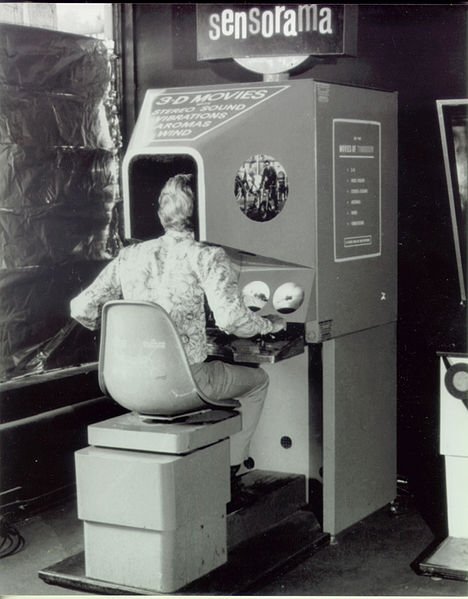 The Sensorama(License: Author-Minecraftpsyco. CC BY-SA 4.0]:Wikipedia Commons
The Sensorama(License: Author-Minecraftpsyco. CC BY-SA 4.0]:Wikipedia Commons The first time humans experienced Virtual reality was when Morton Heilig, a filmmaker invented sensorama in 1962. The sensorama wasn’t mobile; it looked like an arcade cabinet where you’d just fit your face or head in, you could see the alternative environment, feel the breeze, smell the aroma, all the individual’s senses was basically turned on. The sensoroma was quite an extraordinary experience at that time but it became a failure due to the fact that it was immobile and wasn’t really adopted by the people.
 (License: Dick Lyon. CC BY-SA 3.0 Unported]:Wikipedia Commons
(License: Dick Lyon. CC BY-SA 3.0 Unported]:Wikipedia Commons In 1968 Ivan Sutherland, a computer scientist invented what he called “the sword of Damocles”; The ultimate display. This device was quite mobile unlike the sensorama but its mobility was restricted. It is regarded as the first actual head-mounted display (HMD) of virtual reality; one of the reasons why some people like to think of Ivan Sutherland as the father or pioneer of virtual reality. This device replaces the user’s reality to an extent but it wasn’t quite comfortable, it was all wired up with restricted mobility. Regardless, Ivan deserves some accolades!
Let’s time travel into the mid-1980s where the virtual reality technology was really revolutionized. You know, the virtual reality technology was just a fascinating technology in the 1950s and 1960s but didn’t have a name. The fancy name “Virtual reality” was coined in 1987 by an American computer scientist and philosopher Jaron Lanier; the power glove was introduced into virtual reality technology at that time. These devices cost about $9000 each in the late 1980s which was a major setback in the adoption of these devices by the immediate population.
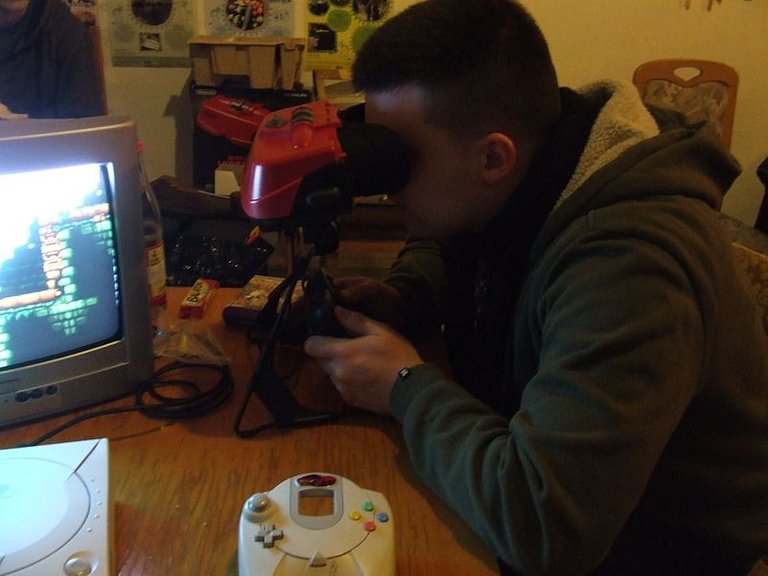 The Nintendo boy console(License: Author - Christo. CC BY-SA 4.0.]:Wikipedia Commons
The Nintendo boy console(License: Author - Christo. CC BY-SA 4.0.]:Wikipedia Commons 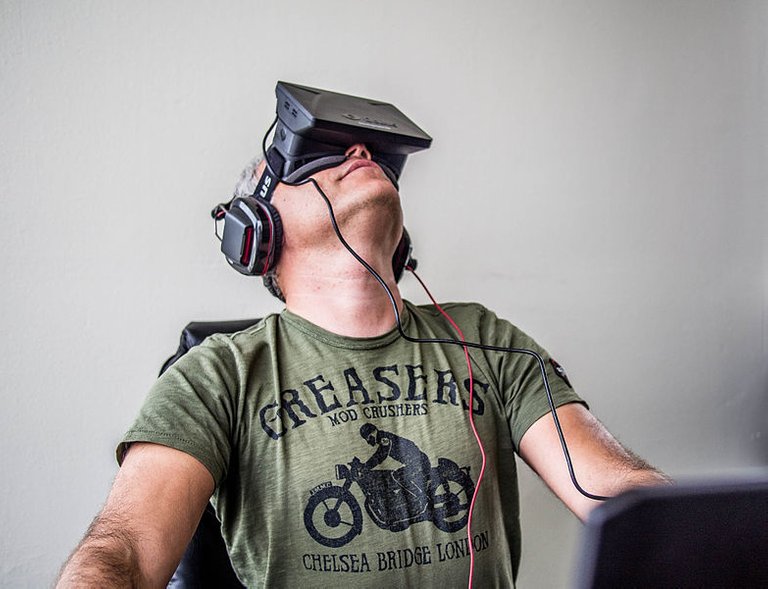 (License: Author-Sergey Galyonkin. CC BY-SA 2.0.]:
Wikipedia Commons
(License: Author-Sergey Galyonkin. CC BY-SA 2.0.]:
Wikipedia Commons
This was a breakthrough for VR as it was then adopted and modified by companies like Htc, Samsung etc; enabling a more advanced and immerse experience of virtual reality. The fun part about this is that Virtual reality evolved from retro to rift; I mean it was immobile and uncomfortable to mobile and comfortable. Now, we can literally experience virtual reality in our homes, how cool does this sound? Pretty cool, I know.
Now that we know a little about how virtual reality evolved, how about we find out about how it’s cousin, augmented reality evolved.
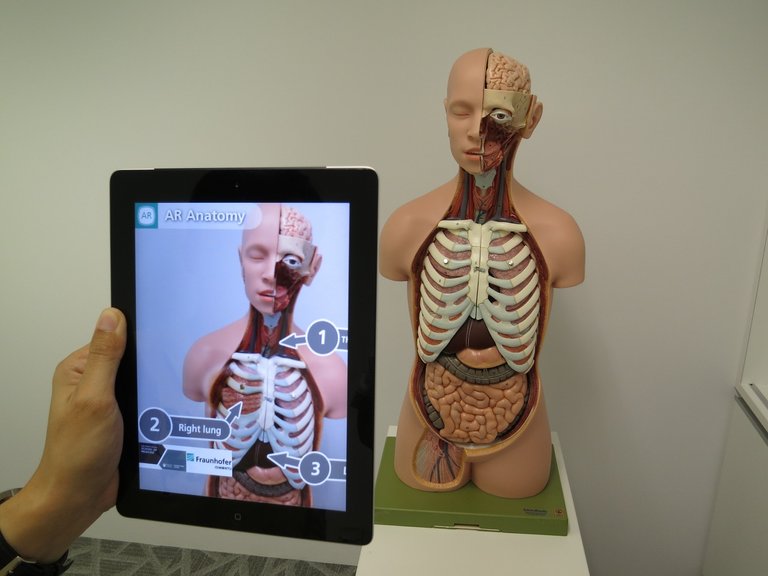 As you can see in this image it doesn’t replace reality, it only adds to reality.(License:CC0.]:Pixabay
As you can see in this image it doesn’t replace reality, it only adds to reality.(License:CC0.]:Pixabay Augmented reality also dates back to the computer scientist Ivan Sutherland with his invention of what he called the ultimate reality -the sword of Damocles. This device was a display of virtual reality and augmented reality. It showed the user computer-generated drawings of wireframes or cubes in the real world. To be fair enough, the sword of Damocles was technically virtual reality not augmented reality.
Augmented reality came into being as an isolated technology on its own in the early 1990s; In fact, the termed augmented reality was coined in the year 1992 by Tom Caudell at Boeing where he was part of Boeing computer development projects.
He tried to assist workers at an aeroplane factory by creating overlays of where the different cables and pipes were supposed to go, using the head-mounted display device.
This according to him, was to assist users to work in the factory without having to use manuals. Another project called karma was utilized in a similar way, where it used 3D graphics to show people how to use a machine without necessarily looking at the mechanic’s manual. Progressed was made in the augmented reality technology in 1994 when an augmented reality medical application was created by Andre state.
This application was an ultrasound augmented reality application where the fetus was easily observed by the physician or gynaecologist when he used the device. This was quite a great project because it made us imagine how the future of medicine and surgery would be with the use of augmented reality.
Well, the augmented reality medical application was not the only form of AR seen in 1994. Martin Julie also made a significant invention in AR (Augmented Reality) when she created cyberspace; this particular technology was for dancers and acrobats and it made them interact with a computer-generated object that was projected into the actual reality itself.
Guess what happened in 1999?......My sister was born! Well, that wasn’t the only thing that happened that year.
The Augmented reality kit-tool was also invented by Hirokazu at the Nora institute of science and technology. This kit-tool provided 3D graphics and allowed video tracking capabilities of actual reality to combine with the computer-generated objects.
It was only available in Operating systems, was and is still is an open source project ( As you read this it is managed as an open source project hosted on Github) that allows contribution from many people with the right skills. Also in 1999 (quite an interesting year for augmented reality), NASA flew a spacecraft with the help of augmented reality; AR helps the flight tests by giving mapping head ups and proper navigation.
In 2000 the augmented reality quake was introduced. The augmented reality quake was the first, first-person shooter game recorded in the AR history. The user would put on head-mounted devices, tablets, GPS inputs, head tracker etc and fight computer-generated monsters in the game. Isn’t that fun? I bet it is
It was best played outdoors but prior to this Fener’s group in the Columbia University had already invented something of the AR quake nature in the year 1997 but it just wasn’t for gamers.
It was an augmented reality touring machine, that users used to tour around the university. It also required head-mounted devices, GPS system, head tracker and a mobile computer or tablet; this machine showed the different parts of the school, pop up like heads up in a video game.
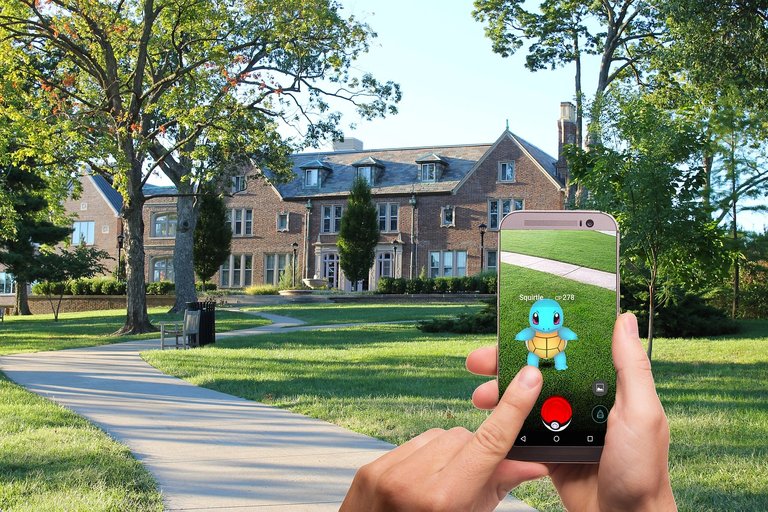 An image showing how the Pokémon go game looks like.(License: CC0.]:Pixabay
An image showing how the Pokémon go game looks like.(License: CC0.]:Pixabay To cut the long story short, augmented reality developed and soon creep into smartphones games and applications. I’m 2016, a popular game that used the augmented reality technology was introduced in some selected countries called the “Pokémon go”; where the computer-generated creatures called the Pokémon interacts with the actual reality. It was a really addictive and fun game to play, Pokémon Go lovers wouldn’t agree less with my claims.
 As you can see in this picture of me, a computer-generated flower crown is simply input in this image using the AR technology. I am the reality in this case; I am not replaced, just a little fixture is added, unlike VR where reality is replaced. :ignore hyperlink
As you can see in this picture of me, a computer-generated flower crown is simply input in this image using the AR technology. I am the reality in this case; I am not replaced, just a little fixture is added, unlike VR where reality is replaced. :ignore hyperlink Another application that uses augmented reality is the famous Snapchat. For Snapchat lovers you’d agree with me 100 per cent on this. They are several features in this application that add to reality like the face swap, the addition of cute puppy ears and tongues to our face, the addition of whiskers and what not. I’ll have to use a picture of me here to better illustrate it.
Augmented reality technology has drastically improved over the years and still has a very promising future in different fields of life. The available augmented reality device in the market now that’s at least worthwhile is the hololens.
Augmented reality(AR) Vs Virtual reality (VR)- They are not cousins not twins and literally can’t replace each other.
Most people think that augmented reality and virtual reality are somewhat replaceable but this to me is like saying that using water to fill your car tank instead of petrol or diesel. Some even try to compare the two, you know, wanting to discover which is better but comparing VR and AR to me is like comparing apples and pineapples; they both have the apples in them just like the reality in VR and AR but are literally not the same thing.
Virtual reality replaces an individual’s reality but augmented reality adds to our reality. Let’s take, for example, you want to play a virtual reality game, you put on your virtual reality headset and whoops you’re in a whole new world, battling monsters or maybe just playing a basketball game. Your brain is successfully filled into thinking that, that’s your actual reality. It’s classic and all fun, just like a horror movie I watched at a local cinema. The sensors, mobile seats, air, heat etc made the computer-generated my new reality as per the movie that I watched.
Augmented reality restricts your views of the virtual world and also what you can do and use it for. Let’s take another example like the Snapchat application and Pokémon go, you can see Pokémon in your environment but you can’t get in there and squeeze it or squash it with your hands, the Snapchat filters are just additives to your face and you’re limited to what you can do with it.
Basically, virtual reality is for the fun humans who are sick and tired of the real world and want something more extraordinary; which makes it more interesting while augmented reality is for the near realist who uses it for most business purposes, sometimes games and other less fun stuff compared to virtual reality.
Conclusion.
Augmented reality and Virtual reality are both forms of combining computer-generated objects with the actual reality where the former replaces reality and the earlier only adds to the reality. The booths forms of reality have evolved from not too promising in the past to extend promising in the future.
Virtual reality is there to give us maximum entertainment in games, cinemas etc but augmented reality is more practical and in my opinion, has a more promising future when need be to compared it to its cousin virtual reality. This is because, as I said it’s more practical in real life and would go along way in solving many problems in the medical sector, engineering sector, school, companies etc.
References
Augmented Reality -Retrieved June 4th, 2018.
Virtual Reality - Retrieved June 4th,2018
Evolution of Virtual Reality - Retrieved June 6th, 2018
Evolution of Augmented Reality - Retrieved June 6th, 2018

A very beautiful post.
Thanks for sharing such an interesting topic.
Congratulations @florae! You received a personal award!
You can view your badges on your Steem Board and compare to others on the Steem Ranking
Do not miss the last post from @steemitboard:
Vote for @Steemitboard as a witness to get one more award and increased upvotes!